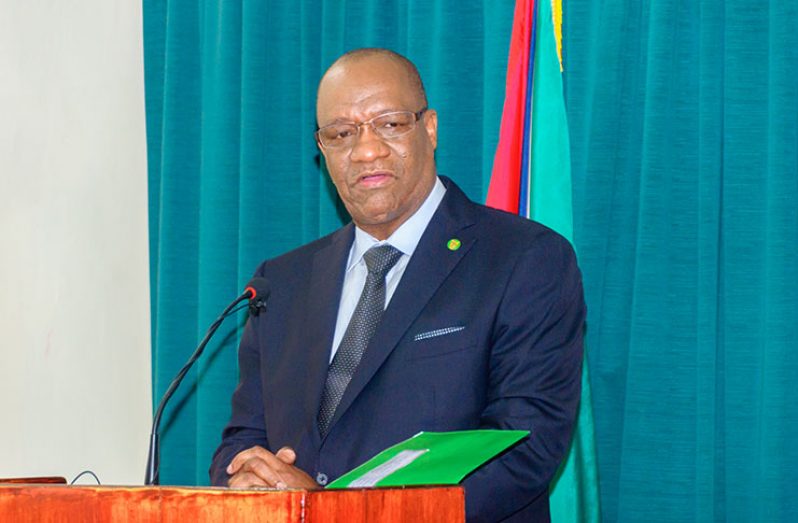– says a lot being done to protect citizens at frontline communities
GOVERNMENT will not act upon hearsay as it relates to matters concerning the Guyana-Venezuela border and that a lot is being done to protect citizens living in ‘frontline communities’, Minister of State Joseph Harmon told reporters Thursday.
He said while the administration is concerned about what transpires at its borders, it is important that residents of border communities who provide information must have evidence to corroborate their stories.
Recent reports of Venezuelan military operations near the border have been unproven and according to Minister Harmon very often residents call their family and friends about issues happening in their communities but fail to report same to the disciplined forces. “We cannot as a nation approach the international agencies, we cannot approach the United Nations (UN) with hearsay, and we have to have credible information upon which we can file these reports, upon which we can dispatch Note Verbales, that is, things that are occurring that affect the security of our borders and citizens,” said Minister Harmon.
He said it is critical that “credible information” is forthcoming in “an era of fake news.” He said Guyana will not put itself in a position where it takes false information unknowingly to the UN. “We have to have credible reports – and verifiable reports about things occurring on our border and I trust that all the citizens of this country who see this broadcast would understand the importance of having credible information upon which we can file these reports to the UN. That is our line of defence and it is something we have to take seriously,” he stressed.
He noted that oftentimes when investigations are done, the reports are found to be wanting. “Time is spent verifying the accuracy of reports which sometimes take you down a trail that doesn’t pan out and it is taking up state resources to verify a lot of these matters,” he said, quietly adding that “anything which occurs on our borders is a matter of concern to us. We cannot have activities which threaten the territorial integrity of Guyana to go unreported.”
As such, Harmon called for there to be corroboration of information presented in reports to the disciplined forces and ultimately the government.
Meanwhile, Harmon said, several measures have been taken by his administration to ensure that persons who live and work in the communities near the Guyana-Venezuela border are assured of safety. “I will not go into all of the things they (disciplined forces) are doing but certainly patrolling is a routine activity for the forces,” he stated. Additionally, it has been noted that there are persons who have personal grievances that make reports to the security forces. This is something the minister said people must desist from doing.
“When these reports come, you have to make a careful analysis of the information before you actually act on intelligence in which the forces can be deployed,” he said while assuring that there is a sufficiency of resources. The challenge however, is the lack of communication with the disciplined forces. “We have to ensure that the information that is provided is passed to them (disciplined forces) quickly that they can
respond,” the minister stated while noting that the disciplined forces are on the ground and have resources at their disposal to respond quickly to reports.
“We have to get the reports to them as quickly as possible so they can respond,” he stated. Additionally, Minister Harmon has assured that “a high level impact” is taking place along the border. He said the matter is being dealt with at the National Security Committee and in fact, Minister of Public Security Khemraj Ramjattan and members of the Parliamentary Oversight Committee recently visited Region One. The Committee’s visit follows several visits by President David Granger after reports of armed gangs in the Cuyuni River harassing Guyanese miners.
“Cabinet noted that the Guyana Defence Force and the Guyana Police Force have mounted high-level, ranking visits to the area in an approach which includes citizens, the Guyana Gold and Diamond Mining Association (GGDMA), the Ministry of Natural Resources’ corps of wardens, in an attempt to collectively address the security situation.”
The oversight committee which comprises persons from government as well as opposition and personnel from the National Assembly visited the area; spoke to persons, policemen and residents to give them the assurance that what is taking place there is being addressed. Harmon assured that President Granger’s policy on frontier villages (Kaikan, Cuyuni-Mazaruni (Region Seven), and Whitewater and Baramita in Region One), as
well as specific actions, is being enforced.
The president, in the Frontline Village Policy, outlined his 10-point improvement plan for frontier villages which aim at ensuring access to public services in the areas of citizenship, registration and immigration, education, human safety, information communication technology, national defence, public health, public infrastructure, social cohesion and social protection.
Last week Guyana submitted its application to the International Court of Justice (ICJ) requesting the court to confirm the legal validity and binding effect of the 1899 Arbitral Award regarding the boundary between Guyana and Venezuela.
On January 30, 2018, UN Secretary-General António Guterres determined that the Good Offices Process between the two countries had failed to achieve a peaceful settlement of the controversy. Guterres took a formal and binding decision, under Article IV, paragraph 2 of the Agreement, to choose a different means of settlement under Article 33 of the Charter.
In identical letters to both parties, the UN Secretary-General communicated the terms of his decision that, pursuant to the authority vested in him by the Geneva Agreement, the controversy shall be settled by recourse to the ICJ.




.jpg)









